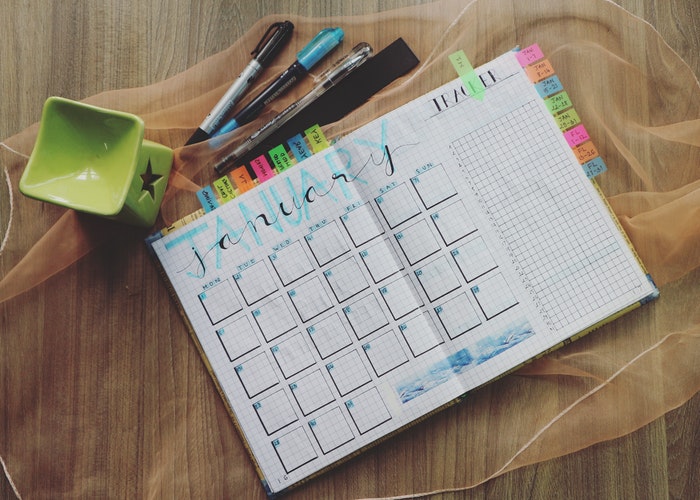My Daily Planner Destroyed My Productivity — Here’s What I Do Now

As someone with anxiety, I procrastinate a lot. And some of my preferred methods for procrastination are pretty standard: I waste time on my phone, spend hours binge-watching TV shows, or just stay in bed way too long. But it took a while to come to terms with one sneaky habit: I often use elaborate day planners or agendas as an excuse to put off actually doing the work.
On the surface, it may seem perfectly reasonable to spend time organizing my schedule and mapping out project timelines, but the problem is I often overdo it. One day, in therapy, I mentioned that I often waste entire hours just writing items on fancy calendars and color-coding tasks (without ever getting any real work done). My therapist made a suggestion that sounds so simple, but made a huge difference: Each day, write a basic to-do list with only the most essential tasks and, as the day goes on, check them off — no complex systems allowed.
To my surprise, it worked. My productivity has gone through the roof since adopting this bare-bones time management process. It just goes to show that, sometimes, less really is more.
My new system
Obviously, a simple to-do list isn’t ideal for mapping out my entire schedule. I still use Google Calendar, which helps me stay on top of important dates, appointments, and miscellaneous reminders. I also use it to plan out recurring tasks like cleaning, blogging, and exercising.
Google Calendar is more of a big-picture tool. It’s best for looking at my entire week, or even my entire month, so that nothing sneaks up on me. It’s useful for setting time management processes on auto-pilot.
Another step I’ve recently added to my routine is using The Five Minute Journal by Intelligent Change. It’s a practice that involves listing three things I’m grateful for, coming up with three things that “would make today great,” writing down two daily affirmations and answering a few reflection questions in the evening.
I mainly use this journal for the mental health benefits, but I often find that answering the question What would make today great? invariably gives me some pretty good ideas for tasks to complete each day. It helps me get centered and adds a bit of intention to my days. (This isn’t a necessary expense, and you could easily incorporate journaling into your daily routine by using any notebook you have on hand.)
The power of a good, old-fashioned to-do list
But the most important tool I use is my to-do list. It’s nothing fancy — just a notepad from the dollar store. Each morning (or, sometimes, the night before), I take the time to pause and consider the most important tasks that I can get done within a single day.
It takes a decent bit of effort to sort through all of my ongoing projects and decide which ones warrant the most attention. But it’s entirely necessary for me to stay focused. Taking that extra time to distill all of my work into a few actionable steps has prevented me from falling down the rabbit hole of excessive time management tools, which ironically, take a lot of time to manage.
Here are some additional questions to consider when looking at your time management habits:
- When am I most productive? And is my current system working, or is there room to improve?
- How many tools do I use to manage my time (i.e. planners, agendas, calendars, apps, software)?
- Is there a way for me to streamline this process?
Sometimes we get stuck in routines just because we’re used to them and not because they actually work. For a long time, I didn’t really question my time management habits, and my productivity definitely suffered.
The financial benefits
The main benefit of this practice has been that I’m simply getting more work done. But there’s also a financial upside: I’m saving money on discretionary spending.
I’m not a big shopper these days. I try to keep my space as minimalist as possible and largely avoid buying unnecessary clothing, purses, or shoes. But I’m a sucker for a cute planner, and I often end up dropping some serious cash at Indigo (a popular bookstore here in Canada). The amount I spend on stationery is never out of control and it doesn’t make me go over budget, but it’s definitely a weakness.
And, in many ways, those agendas and planners were just aspirational purchases. I somehow believed that, if I had the nicest calendar possible, I’d finally stop procrastinating and magically become an organized person. Spoiler alert: it didn’t work.
So, while ditching the stationery aisle hasn’t drastically changed my overall budget, it’s made me realize that some purchases made in the name of productivity can seriously backfire. And that the act of questioning my purchases is something I should do more often.
Optimizing your productivity is a daunting task — especially in the current times. Making small tweaks to your routine, like keeping a basic to-do list, can help keep things simpler and more manageable.
There’s no need to abandon your agenda if it’s something you find genuinely useful. But if you’re someone who struggles with procrastination despite using such tools, try cutting back, and see what happens.
Mercedes Killeen is a Toronto-based freelance writer and editor. You can learn more about her work, and order her freelance services, at mercedeskilleen.com.
Image via Pexels
Like this story? Follow The Financial Diet on Facebook, Instagram, and Twitter for daily tips and inspiration, and sign up for our email newsletter here.




